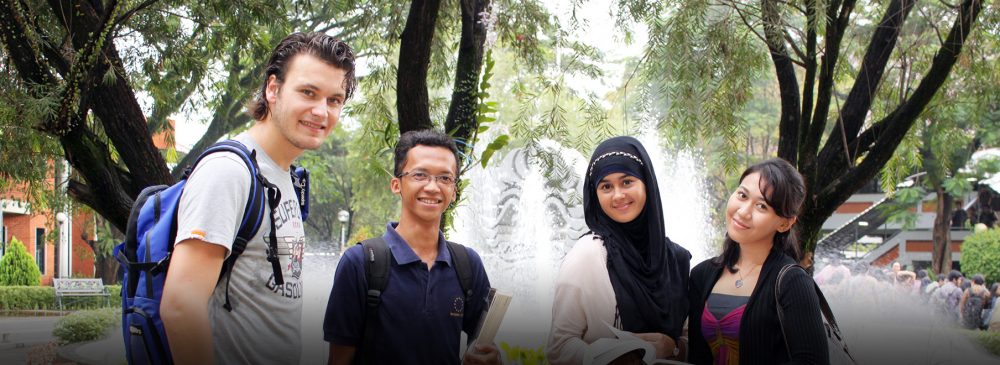
The Postgraduate Program in Economics (PPIE) of the Faculty of Economics and Business, Universitas Indonesia, held a Master’s Program in the field of Economics, based on the operating permit of the Director-General of Higher Education Decree No. 577/DIKTI/Kep/1993 concerning the Ratification of the Implementation of Masters and Doctoral Study Programs at the Universitas Indonesia. This Master’s Program in Economics has managed to maintain an A accreditation status from the National Accreditation Board for Higher Education (BAN-PT), which is valid until September 26, 2022.
To become a reputable Master’s level Economics learning center at the national and Asian levels, thereby contributing to the development of Indonesia and the global community.
This area of concentration examines specifically the performance of the monetary sector and money market concerning the overall economic system to influence employment, output, inflation, and balance of payments, with a general focus on determining interest rates and exchange rates—compulsory concentration courses: Monetary Economics and Financial Economics.
This field of specialization examines the influence of differences in resources and consumer preferences between countries and the role of international institutions on economic activities in a country and tries to explain the patterns and consequences of transactions and interactions in the trade and investment sector between countries that affect the flow of goods and services out or into a country—compulsory specialization courses: International Trade and International Finance.
This field of specialty examines problems in urban areas, such as density, location, transportation, migration, land use, and the environment. Specifically, we use economics that pays attention to the spatial dimension to understanding the economic processes that underlie urban and surrounding development. Compulsory specialization courses: Regional Economics and Urban Economics.
This specialty field examines the public sector’s role in increasing economic growth, social welfare, efficiency, and equity through revenue and expenditure budget policies and other public policies—compulsory specialization courses: Public Economics and Public Finance.
This field of specialization examines the behavior of companies and industries. It markets to understand topics such as determining the level of production capacity, output and prices, decisions on product differentiation, investment in research and development activities, industry behavior is shown by the level of market competition, and the influence of policies and practices. Regulation of the level of market competition. Compulsory specialization courses: Industrial Organization 1 and Industrial Organization 2.
This field of specialization examines the function and dynamics of the labor market, especially for workers who receive wages, by analyzing the interaction between workers and employers and understanding their relationship to conditions of wages, employment opportunities, and income—compulsory specialization courses: Labor Economics 1 and Labor Economics 2.
This field of specialty examines various economic aspects of the development process in low-income countries that can promote economic development, growth, structural change, and development of the quality of the population in terms of health and education to determine development policies and strategies at the domestic or international level—compulsory specialization courses: Development Economics and Quantitative Analysis for Development Economics.
The Master of Economics program aims to produce graduates who can choose economic theory, the latest empirical methods, and use science and technology-based technology to evaluate social and economic problems scientifically through an inter or multidisciplinary approach and manage economics research so that they can produce innovative scientific works. Conclusion and tested and able to be competitive in research in the economic field by taking into account aspects of global change, ethics, and social responsibility so that it is beneficial to society and science and can gain national and international recognition.
The implementation of the study program follows the UI Rector’s Regulation Number 2 of 2021. The Master of Economics Study Program curriculum has a study load of 40 credits, consisting of 34 lectures and six credits of research designed for four semesters full-time. The maximum study period is six semesters.
In domestic programs, lectures consist of 31 credits of compulsory study programs and faculties and nine credits of elective/specialized courses. Compulsory courses for study programs aim to establish core competencies, consisting of courses in Macroeconomic Theory, Microeconomic Theory, Economic Mathematics, Econometrics, Research Methodology, Research Proposals, and Academic Writing. Our program divides Elective/concentration courses into seven areas of concentration. Each student must choose three elective courses in 7 areas of concentration, where students need to take at least one from the PPIE master’s program. Meanwhile, in the joint degree program, lectures consist of 24 credits of a compulsory study program and six credits of elective/specialized courses. Students must take all courses in English class.
Domestic program students take all credits at the Universitas Indonesia. Joint degree program students take part of the credit at the Universitas Indonesia and part at the partner university. The domestic program is designed for four semesters at UI, while the joint degree program is two semesters at UI and two semesters at foreign partner universities (overseas).
Joint degree program students will have active status at UI in semesters 1 and 2, then overseas status in semesters 3 and 4. Due to differences in the academic calendar between UI and foreign partner universities, some joint degree program students have overseas status until semester 5.
Website: https://ppie.feb.ui.ac.id/
Address :
Postgraduate Building – FEB UI Depok UI Campus
Tel : +62 21 7888 0746/47, 727 0164
Fax : +62 21 7888 0745
Mobile : +628111990729
Email : graduate.econ.feb@ui.ac.id
